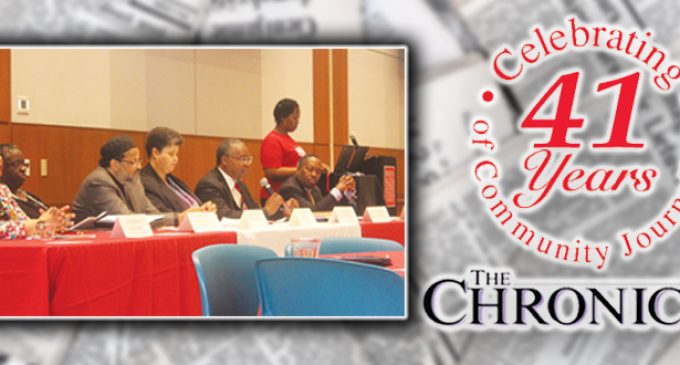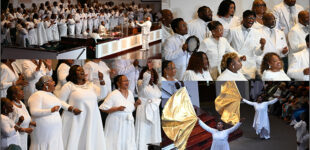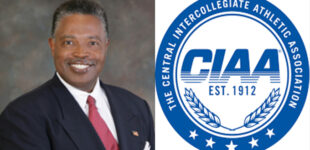WSSU, community frankly talk about education reform

Photo by Tevin Stinson
Flemming El-Amin, with the microphone, a member of the Forsyth County Board of Elections, discusses the state of education in North Carolina as other panelists listen during the first Transforming Education Community Roundtable held on the campus of Winston-Salem State University Friday, April 15. Other panelists are (L-R) Kimya Dennis, Salem College;Ruth Hopkins, Carter G. Woodson School; Imam Khalid Griggs, Wake Forest University; Donna Rogers, The Chronicle; and Kenneth Simington, Winston- Salem/Forsyth County Schools. T. Sharee Fowler, Forsyth Promise is not visible
University sparks important conversations during first Transforming Education Community Roundtable
BY TEVIN STINSON
THE CHRONICLE
Community members from all walks of life gathered on the campus of Winston-Salem State University (WSSU) to discuss ways to enhance public education in the area last Friday.
The first Transforming Education Community Roundtable brought together a variety of community representatives and stakeholders from the city and surrounding areas to engage in a series of roundtable discussions on a number of topics including the state of education in North Carolina, creating cultures of curiosity for minority students, and the links between thriving schools and thriving societies.
During the opening roundtable discussion, Forsyth County Board of Elections member Flemming El-Amin said he will not be satisfied with the public school system until people of color are exceeding expectations, not just meeting them. El-Amin mentioned it is up to teachers and members of the community to ensure that students understand the importance of education.
“In the 21st century, meeting expectations is not enough,” he said.
“We as a community have to make sure that our students understand how important education is.”
El-Amin told those in attendance that when he was a student, he had teachers like Flonnie Anderson who would accept nothing but the best from her students.
Director of Carter G. Woodson School Ruth Hopkins said those who instruct in the public school system need to address the “unconscious internalization of the external social and cultural reality of inferiority that is continually practiced in these United States of America.
“Until that is addressed, they will be unable to instruct those who are in need of instruction,” said Hopkins.
Roundtable Two touched on a number of topics including, how schools should go about connecting with the community, keeping students interested, early childhood education and selecting the right teachers for minority students, among a host of other things.
Retired Principal Nora Baker said the people making the policies don’t understand what they are up against. Baker, who worked in the Winston-Salem Forsyth County School System for 31 years before retiring last year, noted that those who are making the decision on our school haven’t been inside a classroom in a number of years.
“They don’t really understand what our educators are up against.”
Baker also mentioned schools with a large minority population should look to hire teachers who are willing to connect with students and parents outside the school.
box,” she said.
“In low-income neighborhoods, students aren’t exposed to a lot of things,” said Wisley. “We have to start showing our kids that they can be better than what they see.”
According to the Winston-Salem/Forsyth County Schools director of alternative education, Dr. Gwendolyn Johnson-Green, more community schools would be the answer for closing the gap between thriving and non-thriving or low-performing schools in the area.
Johnson-Green mentioned community schools would provide the wrap-around services needed in minority schools.
“Community schools involve all the stakeholders in the community,” she said. “Thriving schools bring together the resources of the school, faculty and community. With community schools, we will be able to take different approaches.”
WSSU Provost Dr. Brenda A. Allen said the roundtable addressed the most important issues badgering the African-American community.
“It’s important that we have this conversation, especially in a city where we aren’t doing as well as we should be,” she said. “Having this conversation here today will greatly help in the ways we think about reforms and making the changes that we need to make.”














